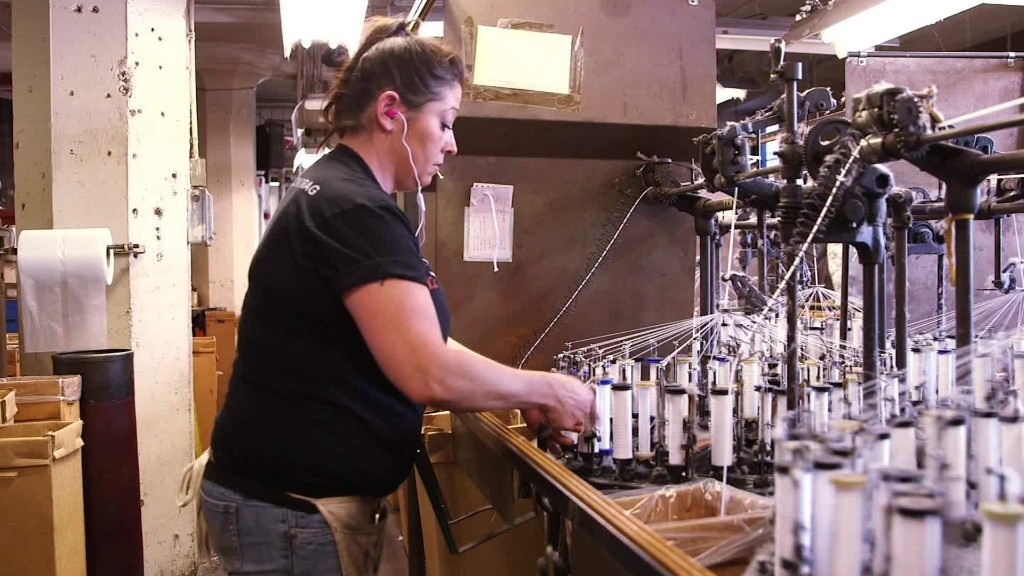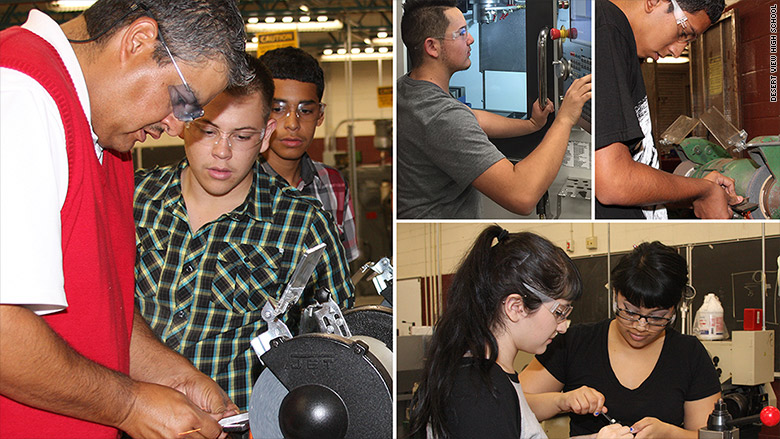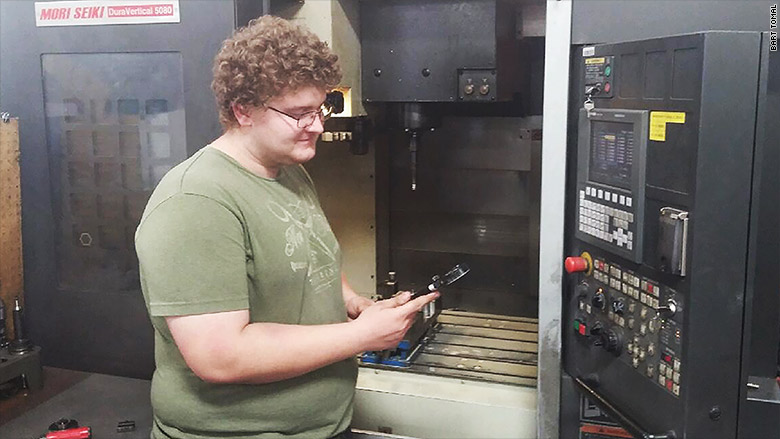
Lots of high school students have after-school jobs. But not that many are manufacturing airplane parts after class.
Students at one Arizona high school, however, are getting paid to craft oil assembly pieces for passenger jets. Hired by a local manufacturer in need of skilled workers, the teens have been certified by a national manufacturing association and work in their Desert View High School lab after class and during the summer.
Part of a nationwide club called SkillsUSA, the money they earn goes into a kitty to fund scholarships and trips to conferences, competitions and events.
"Instead of students trying to find any entry level job, [they have] a career pathway they can build on," said Kathy Prather, director of career and technical education at Sunnyside Unified School District in Tuscon. "It's life changing because they see that pathway."
Four years ago, the students wouldn't have had this opportunity. That's because the Tucson school district had a tiny vocational program, with about 30 students using simulation software and outdated equipment.
But like a growing number of high schools around the country, Desert View is reviving and revamping its career training program, which it now calls iSTEM Academy, to include more manufacturing classes. More students and educators view the industry as a high-tech, well-paying career option.
"This type of class went away after a lot of jobs went away," said Mike Matticks, chair of the industrial tech department at Leyden High Schools in Franklin Park, Illinois. The district reopened a metalworking lab at one of its campuses in 2015, more than 20 years after it was shuttered because of lack of interest among students. "Now we are starting to see a resurgence of jobs."
Related: The men America has left behind
Companies are also turning to these schools to train the next generation of factory workers. Desert View's iSTEM Academy was launched to address the concerns of employers in Tuscon's aerospace corridor, who had formed the Southern Arizona Manufacturing Partnership. Their employees were aging -- many were in their 50s -- and they couldn't find enough skilled recruits.
"We put ads in the papers and expected people to fall from the sky who were trained," said Don Theriault, a partnership member and president of Industrial Tool Die & Engineering.
The district, which is heavily poor and Hispanic, overhauled its career training program at Desert View under the partnership's guidance and in conjunction with the local community college. Now, more than 240 students are learning precision manufacturing, mechanical drafting & design, and engineering sciences in the iSTEM Academy. Desert View even recently built a quality control lab and plans to add a prototype lab where students will make products with 3-D printers.

The manufacturing partnership's advisory board meets monthly and suggests what the school needs in terms of equipment, curriculum and certifications for the students. The school's instructors also spend time at different companies over the summer to become better versed in the needs of today's employers.
Early on, the manufacturers found that the teens were running into trouble with math so it talked to educators about beefing up those skills, Theriault said.
"Everything we did was based on what the industry told us they needed," Prather said. "It's now seen as a pipeline. A workforce is being built and it's transforming the community."
Related: Why it would be tough for Trump to bring jobs back from China
The students can graduate with certificates in manufacturing programs, such as SolidWorks and Mastercam, and gain up to 12 college credits. Nearly all get paid internships, jobs, or scholarships to continue their training at nearby Pima Community College.
The manufacturing partnership also offers an 18-month internship program for high school graduates, during which they work for a local manufacturer over the summer and attend community college during the school year, while continuing to work. After they complete the program, they are only three classes short of earning an associate's degree, which they can finish on their own.
Some 47 students from Desert View and another local high school applied for paid internships over the past three years, and 28 of them are still in the program or have been hired full-time, Theriault said. At his shop alone, he's hired eight teens. They start at $8.50 an hour, but can make $15 an hour after two years.
This year, 20 more students started in the partnership's internship program. It expects up to 30 students for the Class of 2017.
The iSTEM graduates make good money, often nearly double the local minimum wage, Prather said. Graduates can earn between $15 and $30 an hour. One grad got a job that provided health insurance for his entire family, while another qualified to buy a home with a swimming pool.
"Manufacturing in our area is thriving," she said. "It's a very viable career opportunity for our students."
Related: These Americans are fighting to bring manufacturing jobs back
Teens in other parts of the country are also finding themselves drawn to factory work.
In Illinois, Bart Tomal, a 2015 graduate of East Leyden High School, took a metals class his sophomore year because he likes working with his hands. His father is a machine operator and encouraged him to pursue a manufacturing career.
The following year, an area employer, Orbit Machining, called the school, looking for interns. Tomal landed an internship paying $9 an hour, and has worked there part-time ever since. He started out doing packing and quality control and has moved up to operating the machines now that he's 19. (Illinois law requires factory workers to be at least 18 to run machinery.) He now makes $11 an hour and expects to move up to $15 soon.

Orbit is helping him pay for mechanical engineering classes at nearby Triton Community College and will send him for further training this fall. He hopes to become a full-time employee after he graduates next year.
"It's a field you can stay in. There are a lot of possibilities," said Tomal, who wants to write the programs that control the factory's machines. "Even if I would be laid off, there's a shop across the street that would take me."
Related: American manufacturing isn't dead yet
Many high school manufacturing programs are working with local community colleges, making it easier for students to obtain associate's degrees or additional certifications. Studies show that students with additional education beyond high school earn more than those who only earn diplomas.
The Donna Independent School District in South Texas has revamped its vocational programs over the past six years with the help of South Texas College. Students in the welding and precision manufacturing technology programs take classes at both schools so they earn a diploma, and certificates in these fields from both the college and industry groups, said Belinda Vega, the district's director of career and technical education. Many go on to finish their associate's degree.
It has been tough for local grads to land jobs, particularly good paying ones. Donna is the second most impoverished district in the nation and 44% of students have limited English skills. So the more education and training they have, the more marketable they are to area manufacturers, Vega said, noting that some grads are making $15 an hour.
"The jobs are available if you have the technical skill level employers are looking for," she said. "That's exactly what we are trying to do."


